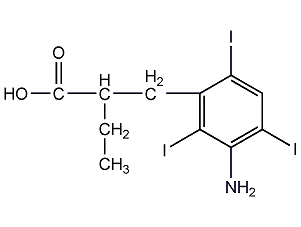
Structural formula
| Business number | 02BK |
|---|---|
| Molecular formula | C11H12I3NO2 |
| Molecular weight | 570.93 |
| label |
2-ethyl-3-(3-amino-2,4,6-triiodobenzene)propionic acid, 3-Amino-alpha-ethyl-2,4,6-triiodohydrocinnamic Acid, 2-(3-Amino-2,4,6-triiodobenzyl)butyric Acid, 3-(3-Amino-2,4,6-triiodophenyl)-2-ethylpropionic Acid |
Numbering system
CAS number:96-83-3
MDL number:MFCD00038687
EINECS number:202-539-9
RTECS number:MW5075000
BRN number:None
PubChem ID:None
Physical property data
1. Properties: White or milky white powder, almost odorless, with a slight special odor.
2. Density (g/mL, 20℃): Undetermined
3. Relative vapor density (g/mL, air=1): Undetermined
4. Melting point (ºC): 153
5. Boiling point (ºC, normal pressure): Undetermined
6. Boiling point (ºC, KPa): Undetermined
7. Refractive index: Undetermined
8. Flash point (ºC): Undetermined
9. Specific rotation (º): Undetermined
10. Autoignition point or ignition temperature (ºC): Not determined
11. Vapor pressure (mmHg, ºC): Not determined
12. Saturated vapor pressure (kPa , ºC): Undetermined
13. Heat of combustion (KJ/mol): Undetermined
14. Critical temperature (ºC): Undetermined
15 . Critical pressure (KPa): Undetermined
16. Log value of oil-water (octanol/water) distribution coefficient: Undetermined
17. Explosion upper limit (%, V/V ): Undetermined
18. Lower explosion limit (%, V/V): Undetermined
19. Solubility: Soluble in sodium hydroxide or sodium carbonate solution, 95% ethanol , chloroform or ether, insoluble in water.
Toxicological data
1. Acute toxicity: Male oral TDLo: 86mg/kg/1W-I; Female oral TDLo: 60mg/kg; Rat oral LD50: 1540mg/kg; Rat peritoneal cavity LD50: 1520mg/kg; Rat intravenous Injection LD50: 280mg/kg; mouse oral LD50: 6600mg/kg; mouse peritoneal cavity LD50: 1230mg/kg; mouse intravenous injection LD50: 320mg/kg; 2. Reproductive toxicity: rats 1-22 days after conception Oral TDLo: 2200mg/kgSEX/DURATION;
Ecological data
None yet
Molecular structure data
1. Molar refractive index: 94.18
2. Molar volume (cm3/mol): 235.2
3. Isotonic specific volume (90.2K ): 675.0
4. Surface tension (dyne/cm): 67.7
5. Polarizability (10-24cm3): 37.33
Calculate chemical data
1. Reference value for hydrophobic parameter calculation (XlogP): 3.9
2. Number of hydrogen bond donors: 2
3. Number of hydrogen bond acceptors: 3
4. Number of rotatable chemical bonds: 4
5. Number of tautomers: none
6. Topological molecule polar surface area 63.3
7. Number of heavy atoms: 17
8. Surface charge: 0
9. Complexity: 277
10. Number of isotope atoms: 0
11. Determine the number of atomic stereocenters: 0
12. Uncertain number of atomic stereocenters: 1
13. Determine the number of chemical bond stereocenters: 0
14. Number of uncertain chemical bond stereocenters: 0
15. Number of covalent bond units: 1
Properties and stability
None yet
Storage method
None yet
Synthesis method
It is obtained by condensation, reduction, acidification and iodination of m-nitrobenzaldehyde (see C7H5NO3, [99-61-6]). 1. Condensation Add n-butyric anhydride and dry sodium n-butyrate into a dry reaction pot, stir and heat to remove moisture. Add m-nitrobenzaldehyde and react at 135-140°C for about 7 hours. Cool and place in ice water to precipitate a dark brown precipitate. Filter and wash away the coke oil to obtain the crude condensate. Dissolve it in dilute ammonia water, heat and decolorize the white clay with activated carbon under stirring, filter the filtrate and crystallize it with dilute sulfate. Filter, wash the filter cake with water, and dry to obtain m-nitro-α-ethylcinnamic acid (C11H11NO4), which is a light yellow crystal with a melting point of 141-143°C and a yield of more than 70%. 2. Recovery and acidification. Dissolve m-nitro-α-ethylcinnamic acid in sodium hydroxide solution, heat to 75°C, gradually add aluminum-nickel alloy and aluminum powder while stirring, and control the temperature at 80-84°C. After the addition is completed, continue the insulation reaction for 0.5h. After reaching the end point, filter. The filtrate is acidified with hydrochloric acid to precipitate precipitate and filtered. The filter cake is m-amino-α-ethylphenylpropionic acid hydrochloride (C11H15NO2·HCL). 3. Iodination: Add dichloroethane to the aqueous solution of m-amino-α-ethylphenylpropionic acid, and add iodic acid monochloride solution under stirring to react. The crude product obtained is refined with dichloroethane to obtain iopanoic acid.
Purpose
This product is a diagnostic drug.

 微信扫一扫打赏
微信扫一扫打赏

